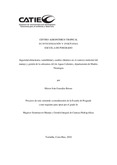Seguridad alimentaria, variabilidad y cambio climático en el contexto territorial del manejo y gestión de la subcuenca del río Aguas Calientes, departamento de Madriz
Description
Tesis (Mag Sc.) -- CATIE, 2010
Abstract
Para este estudio se tomó a la subcuenca bimunicipal del río Aguas Calientes en el departamento de Madriz, Nicaragua, para hacer un análisis de la seguridad alimentaria mediante una metodología que permite de manera rápida obtener el nivel de inseguridad alimentaria a nivel de hogares resultando que el 47,36% de los hogares se clasificaron bajo Inseguridad Alimentaria Severa (IAS) y un 44,21% bajo la clasificación de Inseguridad Alimentaria Moderada (IAM). Las obras de conservación de suelos y la reforestación resultaron ser las estrategias más utilizadas por los productores para hacerle frente a las adversidades del clima. Mediante árboles de problemas se identificaron estrategias de manejo y gestión de cuencas hidrográficas, así como otras, para hacerle frente a la inseguridad alimentaria. También se identificaron los rendimientos de la Producción de granos básicos (fríjol, maíz y sorgo) en las épocas de siembra de primera y postrera de 2009, los cuales resultaron bien bajos, lo que influyó en los porcentajes de inseguridad alimentaria tan críticos alrededor de la subucenca. For this study the sub basin of the river of Aguas Calientes was taken as the study area, in which was made an analysis of the food security through a methodology that allows the determination in a fast way, the level of the food insecurity of the households, resulting that 47,36% of the households were classified under Severe Food Insecurity (SFI) and a 44,21% as Moderate Food Insecurity (MFI). Soil conservation works and reforestation resulted to be the most utilized strategies by the producers against the adversities of the climate. Through the problem tree methodology were identified the management strategies, as well as other kind of strategies, to fight the food insecurity in the basin. Also with semi structured interviews, the yields of the production of basic grains (read bean, corn and sorghum) were identified, specifically in the first and second seasons of planting of 2009, and compared with the yields of other years, resulting very low, fact that influenced in the high percentages of the food insecurity levels along the basin.
Keywords
Publisher
Centro Agronómico Tropical de Investigación y Enseñanza (CATIE), Turrialba (Costa Rica)
URI (Permanet link to cite or share this item)
https://repositorio.catie.ac.cr/handle/11554/5524Collections
- Tesis [3115]


